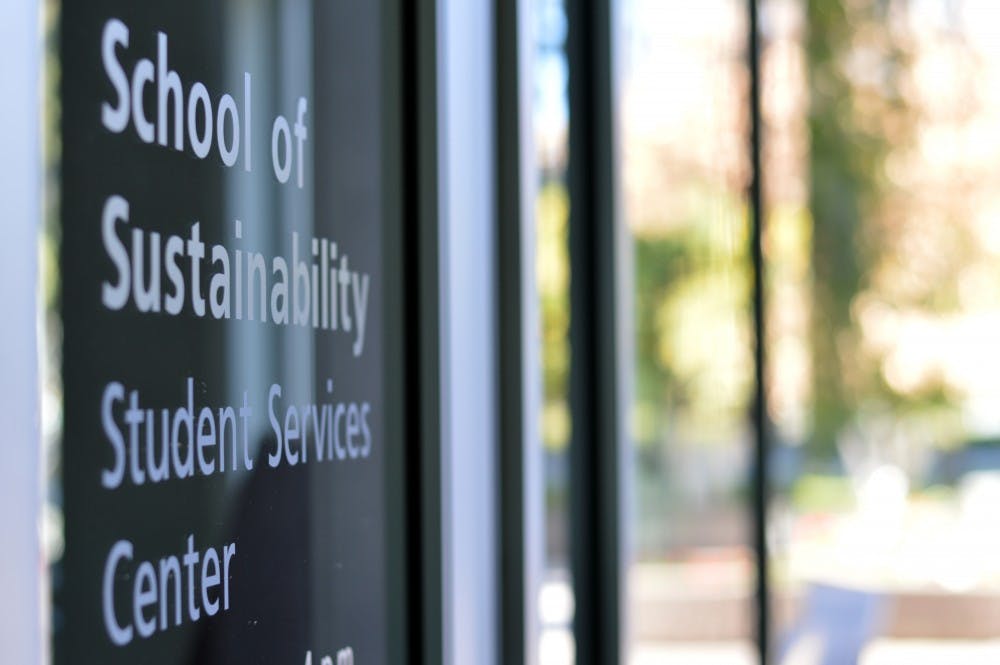 ASU recently partnered with the city of Phoenix to create programs that look to transform waste streams into economic development for the area. (Photo by Axel Everitt)
ASU recently partnered with the city of Phoenix to create programs that look to transform waste streams into economic development for the area. (Photo by Axel Everitt)The first phase of the city of Phoenix’s new landfill diversion program is set to begin July 7, as part of a larger sustainability initiative to divert 40 percent of waste into reusable resources by 2020.
Joe Trujillo, assistant public works director at the Phoenix Public Works Department, said there is great potential for otherwise disposed waste to be put a valuable use.
“There is no such thing as trash," he said. "There are only resources.”
The “Green Organics Curbside Collection” program will give residents the option of receiving a new tan bin in which they would deposit all grass clippings, shrubs, branches and twigs for an additional $5 per month. The first phase will make the bins available to residents living within certain areas in the central corridor of Phoenix.
The organic material would then be transported to a new facility off 27th Avenue developed by the ASU Global Institute of Sustainability, where it will be converted into usable compost.
The city’s partnership with ASU, known as Resource Innovation and Solutions Network, is working with large corporations and companies to develop new ways to turn trash into valuable resources or usable energy.
RISN has reached out to large grocery store chains like Fry’s and Bashas' to develop a grocery food scrap program in hopes of reducing food waste. RISN is also partnering with Amaresco, the largest independent energy services company in North America, to research possible ways to turn waste into usable energy.
“This may be a Phoenix-ASU program, but it’s a global initiative, a global network to share solutions,” Trujillo said.
RISN already has a “hub” in Lagos, Nigeria, he added.
The Public Works Department is also introducing the “SAY R&R,” or “Save As You Reduce and Recycle” program, in which residents can swap their 90-gallon trash bins for smaller, more compact 65-gallon bins. The smaller bins would be available at a discount of $3 per month.
According to the Public Works Department, Phoenix throws away 1.25 billion pounds of trash each year — enough waste to fill Chase Field 14 times.
“Eighty to 90 percent of our waste is shipped to a landfill or to China,” Trujillo said. “The idea is to bring it back into the local economy.”
City Councilman Bill Gates, who also chairs the Finance, Efficiency, Economy, and Sustainability Subcommittee, said the Reimagine Phoenix Initiative is about investments that pay off.
“As a Republican, my first thought is always, ‘Will this save taxpayer dollars?’, and in reality, we find time and time again that sustainability does save money,” Gates said.
He said the city of Phoenix approved an $88 million budget for utility costs this past year.
“There’s definitely an opportunity for savings there,” he said.
Some costs will be absorbed by the city of Phoenix 2013-18 Capital Improvement Program, which budget exceeds $1.2 billion, according to CIP documents.
Environmental Quality Commission Vice Chair Jessica Garcia said she believes additional funding may be needed to see some of the sustainability programs through, and that funds will only be secured when residents can trust their local government.
“This is an issue of ‘Hey, if we give you money, are we going to get what we’re promised?’” Garcia said. “We must prove to citizens that what we say, we mean.”
Reach the reporter at mmspear@asu.edu




